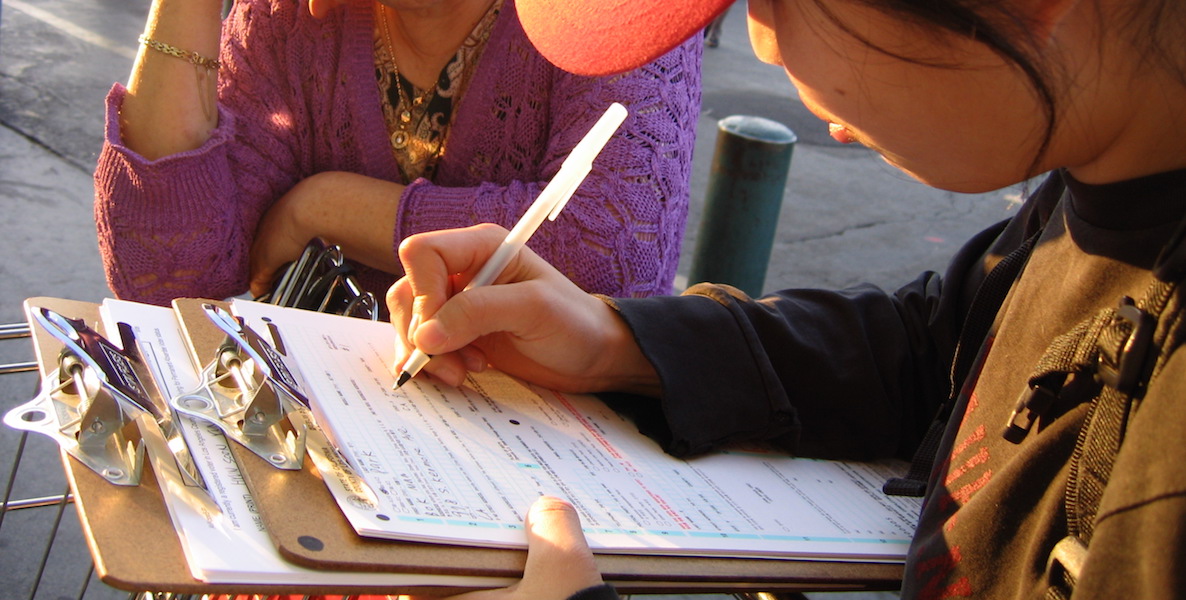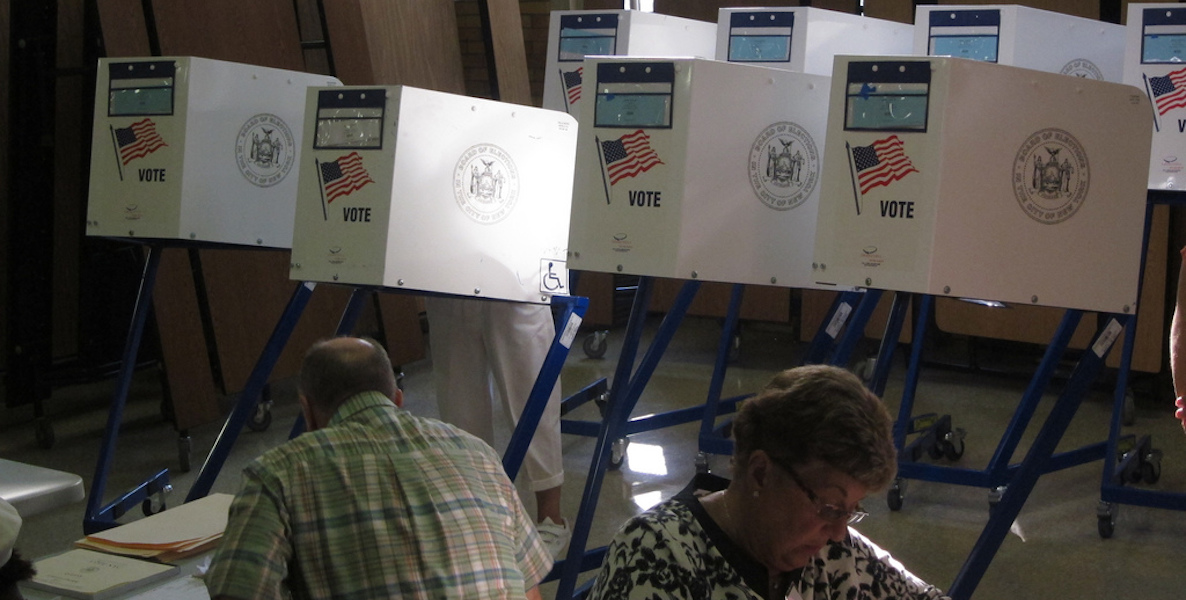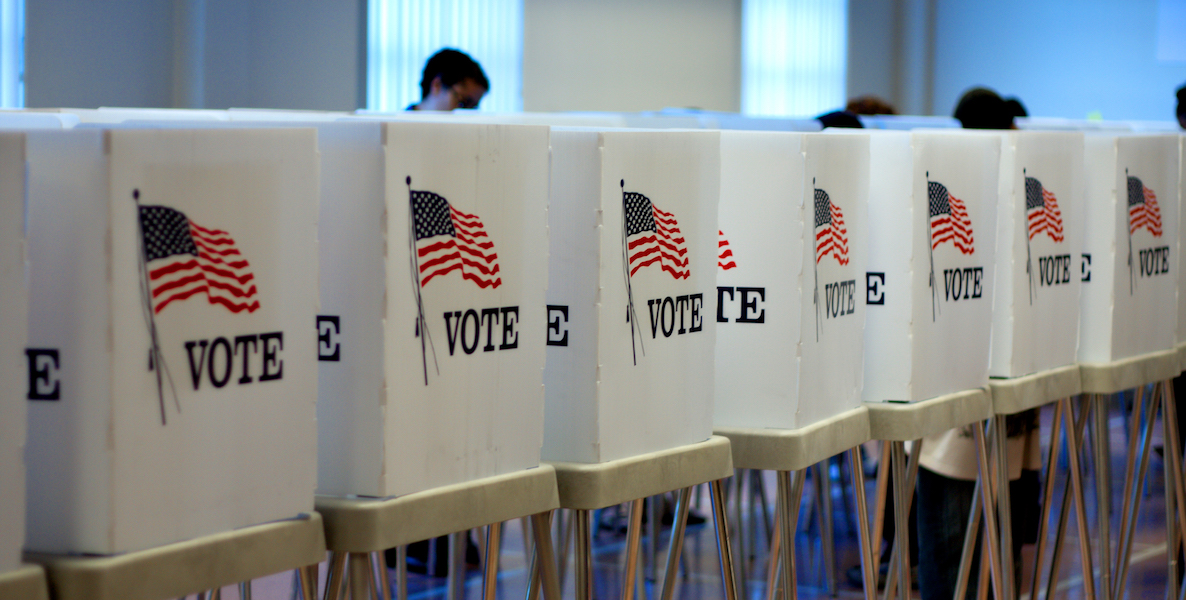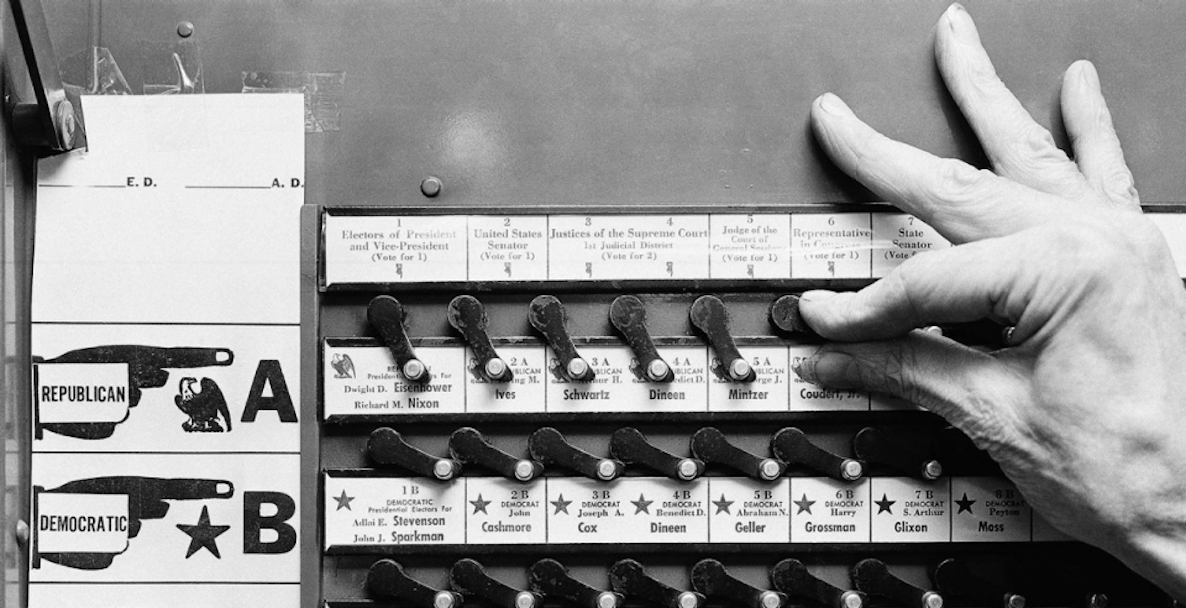It’s a hot time in the old folks home these days. Elections are coming up in November and these guys are psyched. I recently asked a dozen or so elderly Americans in my Philly retirement community to tell me when they first voted, why, how they felt about it then, what mattered to them back when they were 21 (you couldn’t vote at 18 back then!) and what matters to them now.

Prefer the audio version of this story? Listen to this article on CitizenCast below:

News Flash: One of the things that matters most to them is getting youth out to vote!!!
So what do they say to an 18-year-old who is getting a first shot at mattering, as in VOTING — how to convince one who says, “I don’t really follow politics”, or, “my one vote doesn’t make a difference”, or“nothing ever changes?”
I got answers from a crazy range of folks: one whose grandparents were slaves, one woman old enough to have gotten a birthday card from Roosevelt, another who remembers having to PAY to vote (a poll tax, it was called, and used during Jim Crow to disenfranchise black would-be voters, poor whites and Native Americans). One was a speechwriter for Richard Nixon of Watergate fame (who resigned in disgrace 44 years ago). All of them remember World War II vividly (one hid in the woods of Germany and foraged wild mushrooms for food!). Many were bored stiff with politics in school, but got the bug later because of issues like social justice, gun violence, peace, healthcare or LGBT rights. Some were kind of embarrassed that they voted for a candidate mostly because he was handsome and hot. A couple of new Americans came from countries we once called enemies. Now citizens, they call themselves “compulsive voters”.
Here’s some of what they said:
A Passion for Peace
Ella Torrey: age 92. Seventy years ago, I went to work for Eleanor Roosevelt at the UN. First thing she asked me was “Are you registered to vote?” I said I was, she asked, “for what party?” Republican, I sheepishly admitted. Smiling, she said, “Am I the first Democrat you’ve ever known?” I said, no, I’d met some in college. She laughed. I soon became a Democrat. My brother, a fighter pilot, was shot down and killed in the war and I vowed “I will work for peace for the rest of my life.” Voting is a great way to work for peace, and I have voted in every election since 1952.
Set an example for your parents!
Bob Polk: age 90. I am the grandson of slaves and a son of staunch Republicans. Yes! I went to a progressive mostly-white church camp in Michigan and my friends asked me why in the world I was a Republican. I said because Lincoln freed the slaves! We were from the south but my father’s family was so poor they couldn’t feed all their children, so they had to give my father away to folks in Chicago. I went to school there where white kids picketed against integration, carrying signs “Negroes Get Out”. One of the first issues I remember being incensed about was the Nisei camps during World War II, (detention sites where the government forced the relocation and incarceration of Japanese Americans). Separating families is nothing new for African Americans. All my life, race has been an important issue to me. I’ve voted in every election since the first. I remember what it meant to my parents not to be able to vote. Whatever your issues, gun violence, gangs, whatever, vote! And get your parents to vote!
The Power of Personality
Larry Landes: age 77. On a class trip to Washington DC when I was in about 5th grade, I met President Nixon, and he shook my hand and looked at me and called me “young man.” His eyes were piercing. I have never forgotten it … the power of that personality. I would have voted him in 1960 but I was too young. About 90 percent of middle class white people in Montgomery County were Republican like my parents. “Nice people” were all Republicans as I recall. We were pretty sheltered. I registered Republican, am now a Dem, but I have voted all over the board. My first vote was for Lyndon Johnson against Barry Goldwater. I was the youngest of five brothers, and that mattered.
I believe every vote counts: look at 2016, a handful of votes in three states made the difference. We don’t know what’s in front of us now, but voting is more important than ever.
We Were too Dumb to Realize…
Emily Starr: age 80. My first vote was in 1958, for John F. Kennedy (against Nixon). I really didn’t know what JFK stood for, but he was so good looking and charming. My friends and I were still in the Eisenhower era, way too dumb to realize the country’s problems. My family didn’t talk politics, but I remember a slogan, “We Want Wilkie” [Republican candidate against Roosevelt in 1940].
College Conservative
James Humes: age 82. I’ve been politically aware all my life. My father was a judge, and he died when I was 8 1/2, so I really got to know him through stories people told me. He was really loved by everyone. One thing he did was to sleep overnight in every jail under his jurisdiction. He said he wouldn’t send anyone to a jail he hadn’t slept in. He told prisoners stories of people who’d been incarcerated and gone on to do great things. One family told me that when they had no coal to heat their home, my father had coal delivered to them. The man said he’d never gotten to thank my father, and he started crying. And when the YMCA turned down a black boxer for membership, my father resigned until they accepted him.
At 28, I was the youngest representative in the Pennsylvania state legislature. But my first “political” campaign was at college. My older brother hadn’t been asked to join any fraternity, and it crushed him. I vowed to bring down the whole fraternity system at the college when I got in. I organized all the guys who I figured wouldn’t make it into a fraternity, kind of misfits. We chose a candidate. Then I pretended to be for the other, popular candidate who was slated to win, and because everyone knew I was against fraternities, they voted against him. And we won!
I got to be Nixon’s speechwriter after years of writing for other public figures. I got the job because I wrote conversationally, not as elegant as some speechwriters, but I wrote the way people talk.
Voting Makes You a VIP
Herb and Toni Kestenbaum: both age 76.
Toni: First time we were eligible, in 1962, we didn’t vote. We were in college. Herb was out of the country and I got the form and took it to be notarized in [my college town] and they refused to register me (for a technical glitch). I was angry but I figured it was the rule. I’ve voted in every election since, even for school board. My parents were committed Republicans; not to vote was considered the original sin. But I switched. My brother was a political junkie ever since junior high. He selected lefties among our parents’ friends to lobby. And he went door-to-door in our neighborhood talking to people.
Herb: As a journalist, I couldn’t indicate my party. Journalists can’t be partisan. Once I signed up to get mailings from one party, and my boss was furious!
Herb and Toni: If you don’t participate you don’t know what you’ll get. Voting says, “I am an important person. I am a grown-up. I get to decide.”
Voting When It Took Guts and Grit
Ann Silverman: age 78. I was living in Guatemala, and to get to vote, I had to take two trips to the capital, one to apply, the other to vote! I often think about the struggle some people had to endure to be able to vote, making great sacrifices including even human life! That makes it hard to understand why some people are so casual about this privilege.
My choice the first time I voted was between: 1) the sitting president [Richard Nixon], who had deceived voters in order to promote his own political ambitions; and 2) the youthful, energetic JFK, who had served in the military and appealed to voters’ optimism and idealism.
I voted for JFK and he won!
(My mother HATED Nixon and confessed that, when he resigned, she missed having him to kick around.)
Fight Every Day, Even if it Means Fighting Your Government
Eva Marie Malsch: age 80. I was born in Cologne, Germany. So I didn’t vote here until 1976, after I became a citizen. When I was little, Germany was at war, and when we were bombed in Cologne, my mother and siblings and I were evacuated to what is now Poland, to a big farm, then later to someone’s vacation home on a lake. My mother was alone with three kids. She was sick and needed surgery but there were no supplies. I went to a one-room school with one teacher for all grades. There was never enough food, and we children were sent into the forest to forage for mushrooms and berries. I remember soldiers bringing us some onions, a big treat!
I don’t remember ever hearing my parents talk about politics. They couldn’t, because if we children repeated what they said, the consequences would be drastic. It was dreadful for my parents.
I came to America — Texas — with my husband, who was a doctor, like me. Becoming a citizen was just a practical matter for me, a nuisance with lots of paperwork really. I didn’t feel any patriotism or anything. But the judge at my [1975] naturalization saved the day. I will never forget what he said, that freedom wasn’t some that you HAVE. You have to fight for it every day, including fighting your own government. That made a real impression on me. It’s true. And I’ve always voted since then.
I’d say to new voters, yes, even if you think the system is rigged, if you don’t vote, you just help the people who rig the system.
Taking on the Bad Guys
Philip Steinberg: age 87. I was born into a political family. My mother was on the election board in our precinct in Indiana. My father was on the school board. I remember them making phone calls for Norman Thomas, the socialist, in 1940. My mother took me with her to the polls on election day, in a garage down the street. My first vote was in 1952 at DePauw College. I was active in the Republican Club, and voted for Eisenhower. I didn’t really care about any issues, it was more personality and leadership qualities. I majored in political science and got interested in good government. In later years, I helped supervise the East Falls polls on election day. I remember one man who insisted that voting machines were inaccurate. He demanded a paper ballot. People have strong feelings about voting. I know I do. If YOUNG PEOPLE DON’T VOTE THE SYSTEM CAN BE TAKEN OVER BY UNSCRUPULOUS GUYS! There are plenty of bad guys out there!!!!
Pay to Play
Jerrie Bartlett: age 87. I actually had to PAY to vote my first time. It was called a poll tax. (The tax was mainly meant to keep poor people from voting.) My husband Allen and I were in Alexander City, Alabama. It was 1950 and I really wanted badly to vote for JFK, and [after I paid] I got to — on a paper ballot. My parents were Republican, but my father was a Georgetown dentist, and he bet on the tracks. Through betting he got to know the doorman at the White House under Roosevelt. So he got the doorman to ask FDR to sign a birthday card to me. I still have it, with the picture of FDR on it.
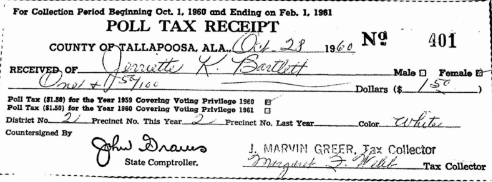
An Immigrant’s Story
Ada Bello: age 84. I come from Cuba, where most everybody belonged to one party, and had to vote for a bunch of nearly anonymous party officials. I left Cuba after the government shut down Havana University in the fifties. Before the revolution, there wasn’t so much persecution, but afterward, they clamped down on “anti-social elements” and sent people to internment camps. I came here in 1958, in my early 20’s. I was a student and applied for a green card so I could work, but I had to be careful because I had gotten involved in an LGBT organization. It was dangerous back then, because I wasn’t a citizen yet, and could have been deported. I became a citizen in time to vote in the 1972 election between Nixon and George McGovern. I voted for McGovern, but local politics were even more important. I helped sponsor a forum with the Philadelphia Lesbian and Gay Task Force, featuring Milton Schapp, the governor, who was a homophile — a strong ally of LGBT rights way back then. Later, in 1983, he sponsored an ordinance protecting minorities.
Voting at 18? When you get to be an adult, you don’t just get rights, you get responsibilities. If you don’t vote, you don’t get to complain. But more important, your choice is between government or corporations running things. Even if there is an appearance that democracy is safe, it is actually very tenuous. You have to vote to keep it safe. That’s vital.
Rebecca Sinkler
Rebecca Pepper Sinkler is a former editor of The New York Times Book Review and serves as editor of Safe Kids Stories.



